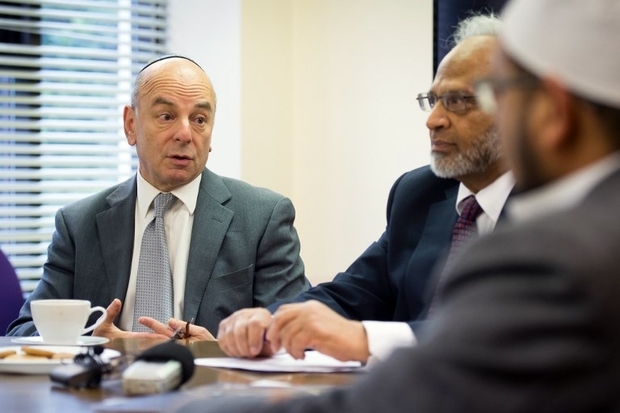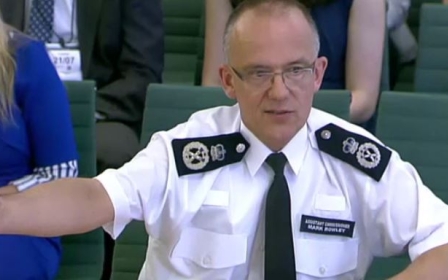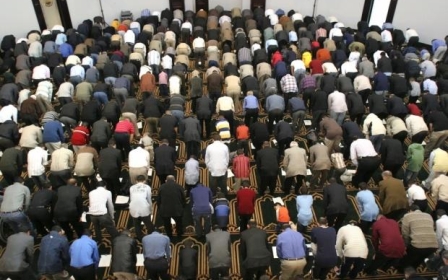UK government urged to end Muslim Council of Britain 'boycott'

The British government needs to fix its “broken relationship” with the Muslim community, according to a report by an influential charity.
“The Missing Muslims – Unlocking British Muslim Potential for the Benefit of All” is the result of an 18-month commission into the place of Islam in public life by the community support group Citizens UK.
The commissioners, who include high profile names from the world of business, academia, politics and faith, travelled the country and are said to have listened to 500 hours of testimony. They have proposed recommendations for the government, Muslim community, civil society and the business world to implement.
The Muslim Council of Britain (MCB), the UK’s leading Muslim representative body has welcomed the findings of the report, which also called for a review of the controversial Prevent policy and fairer reporting on Muslims by the media.
“Wider engagement,” the report said, “including the robust challenging of views with which it disagrees, rather than the apparent boycott of certain organisations, could best enable the Government to hear from the widest possible cross-section of the UK’s Muslim communities, including young people and women.”
“There is a broken relationship that needs to be resolved, and both parties need to be proactive in addressing this.”
The report also said that respondents had "expressed criticism" of the work carried out by think tanks and NGOs that "do not necessarily carry the confidence of the Muslim population, yet have become increasingly influential in shaping government policy." It added that "the current policy of non-engagement with entities such as the Muslim Council of Britain" was deemed to be "counter-productive".
Talha Ahmad, MCB’s treasurer, said Citizens UK is credible because it “has a strong track record within the British Muslim community” and “knows how policy-makers work”.
But he added that by failing to work with organisations like MCB, the British government are “reinforcing the idea that Muslims do not have a fair position in British society”.
Islamophobia on the rise
The MCB which is the largest representative body for UK Muslims, with about 500 affiliated mosques and community groups, enjoyed a good relationship with the British government since its founding in 1997 up until the 7/7 bombings in 2005 after which, according to Ahmad, the government began to see the Muslim community “primarily intertwined with the idea of counter-terrorism and radicalisation”.
Things took a turn for the worst in 2009 when then Minister for Communities and Local government Hazel Blears demanded MCB Deputy Secretary General Daud Abdullah resign after he signed the Istanbul Declaration - a statement of support for Palestinians resisiting occupation - which she claimed supported violence against British troops and Jews.
Abdullah denied the claims, and - because he was democratically elected - refused to resign. MCB members argued that he had signed the document in a personal capacity.
Since then, Islamophobia has increasingly become a feature of British life, and MCB has been out in the cold, activists say.
On the other hand, MCB's counterpart in the Jewish community, the British board of Deputies, was able to spearhead the adoption of a new definition of anti-Semitism by the government last year.
The Citizens UK report added that the government is lagging behind in tackling Islamopobia. “More is needed from the Government to initiate a strategy that addresses anti-Muslim prejudice and ensures that it is dealt with in the same way as other forms of prejudice (such as anti-Semitism) by taking a zero-tolerance approach,” it said.
It also called for the adoption of a new working definition of anti-Muslim bigotry that should “have broad consensus on the boundaries of hatred and prejudice, and could be informed by the definition of anti-semitism adopted by the Government in 2016.”
Ahmad added that the lack of engagement with organisations such as the MCB may also have fed into the Islamophobia narrative by failing to challenge the idea that “Islam and terrorism are interlinked”.
“It has provided ground space for detractors to capitalise on and demonise Muslims,” he said.
Concerns over Prevent
The report also expressed “concern” over the controversial Prevent counter-terrorism policy and where “anxiety about Prevent is causing Muslims to ‘shut down’ from expressing what are considered to be reasonable views in public arenas, be it schools, universities or work place, for fear of being labelled extreme”.
It called on the government to launch a major review via an independent panel comprised of individuals with relevant expertise and representative of schools and public institutions.
Ahmad said MCB had been calling for a “root and branch” review of Prevent. He added that such an important policy “had to be shaped on scientific evidence and has to have buy-in of the whole community”.
“There should be a thorough, open, review of prevent. If the review finds it's so toxic– which we think it is - then it must go," he added.
But following the recent attacks in London Bridge and Finsbury Park, “there has been some recognition by government of the wider community,” Ahmad said. He pointed to MCB’s participation in a collective vigil after the London Bridge attack and low-level discussions the organisation has been having with ministers.
“We would work on basis of mutual respect, fairness, we would not be dictated or desperately seek to work with others,” he said.
“We perhaps feel we are moving towards working collaboratively [with the government] for the greater good.”
New MEE newsletter: Jerusalem Dispatch
Sign up to get the latest insights and analysis on Israel-Palestine, alongside Turkey Unpacked and other MEE newsletters
Middle East Eye delivers independent and unrivalled coverage and analysis of the Middle East, North Africa and beyond. To learn more about republishing this content and the associated fees, please fill out this form. More about MEE can be found here.




